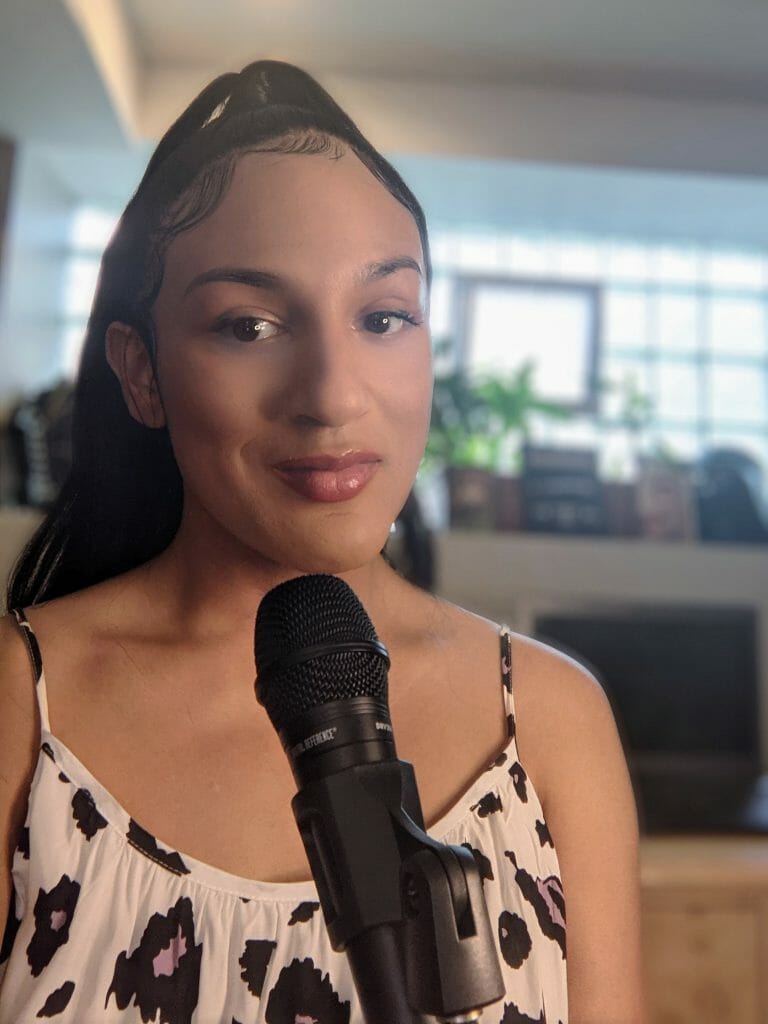As part of Transgender Awareness Week, GLAAD is elevating transgender and gender nonconforming advocates who are working for safety and acceptance in their local communities.
Morgan Sherm is a veteran radio producer who is advocating local news and law enforcement to ensure accurate representation of transgender people in Chicago.
GLAAD: Before you were a full-time advocate, you were a working journalist. What did you see on the job then, that helps your work now?
MORGAN SHERM: I saw the excuses used when things happened to parts of the audience we were uninformed about. I know the thinking behind why groups aren’t given the required attention.
GLAAD: At least four transgender people have died of violence in Chicago this year, with three of them misgendered or deadnamed in media reports. What’s a concrete way journalists can avoid these mistakes?
MORGAN SHERM: We can treat people who have lost their lives like people. A lack of courtesy is the reason this happens in my opinion. Find a source beyond the death notice or police alert that is confirming the information you are looking at. If somebody else was lazy enough to repeat incorrect information involving the death of a trans person from the police newswire – you can bet there are others especially in the trans community working to correct those facts. Stop rushing to be first and strive to be accurate.
GLAAD: Can you explain the danger to transgender people when news media do not accurately report on trans victims of crime?
MORGAN SHERM: The danger connected to the misreporting of transgender victims of crime is multi-fold. On a macro-level, the public safety and other governmental organizations that use the numbers to identify the level of danger in an area are not getting accurate information to deploy necessary resources. On a community level, the people who know the victim are further traumatized as this person they care about is being misrepresented. On a micro-level, you’re showing people it’s okay to misgender/dead name transgender people.
GLAAD: You’ve been working within some of the most entrenched institutions in Chicago, including law enforcement and coroner offices, to change their approach to reporting on transgender people. What have you learned in your outreach to them?
MORGAN SHERM: I have learned that a very slow approach is being taken to correct these practices in the Chicago Police Department. Over the summer they updated their policies on interactions with transgender people. As of this interview, they have not scheduled training for these updated policies. Because they have not gone through training they can’t enforce the policy. The medical examiner’s office says they must publish information based on vital records. They are aware of how updating vital records is less likely for transgender people of color, given the difficulties of cost and access, but they are not doing anything to change the process. So, this requires attention on a legislative level. I would encourage people to reach out to state legislators to remove barriers to changing vital records so that trans and nonbinary people can be accurately recognized and represented.
GLAAD: Earlier this year you advocated on behalf of trans people in a private meeting with journalists in Chicago. How do you think all outlets can improve their coverage, not just of trans people in tragedy, but while alive?
MORGAN SHERM: They can intentionally cover the trans people that are a part of their demographic. Trans people are fighting daily for dignity and decency in any walk of life they take part in. Look for trans people who work in the private sector or public sector. Look for trans people who are part of activity groups and organizations. There are far too many people who use the excuse that they don’t know any trans person. These outlets should also hire trans reporters and journalists. Hire them to not just cover these stories. Hire them to cover politics, education, sports, everything. Representation matters.
GLAAD: What’s one story you wish local news would cover in Chicago that would improve the lives of transgender and gender-nonconforming citizens?
MORGAN SHERM: Equity. In the past year and a half we’ve seen companies hire a lot of DEI people but are trans citizens included in the people they hope to serve? In educational setups, trans students are victims of more bullying which can lead to disinterest or discontinuance. In professional setups, trans people are less likely to get hired based on their appearance or not given growth opportunities within said company. In religious spaces, trans people are unwelcome and made to feel unsafe. On a societal level, trans women aren’t allowed to be loved in public because we’re being killed at an alarming rate here in Chicago. Equity of treatment is the story I believe needs to be covered.













